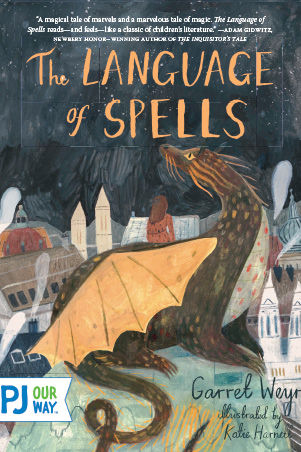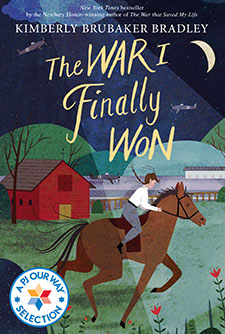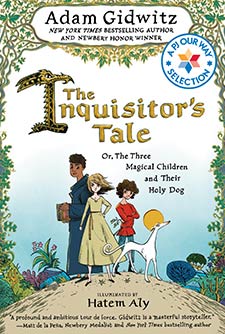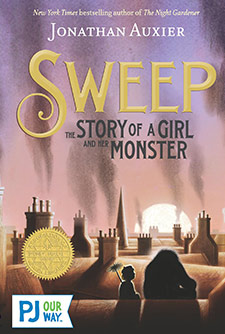The Language of Spells
Grisha the dragon has been under a spell for 100 years. After he’s freed, he finds that a large number of other dragons have disappeared. Then he meets Maggie, the only human who can see him. Can the two rescue Grisha’s missing friends?
Average Rating
( hint: Login to leave a review! )
91 Reviews
Leave Review
What the Book Is About
Jewish Content & Values
Positive Role Models
Content Advisory
Talk It Over!
More for You
11-year-old Maggie lives in a hotel with her poet father. Grisha is a dragon who is released from a spell, only to find that all the other dragons have disappeared. Grisha and Maggie each become the other’s first true friend, as well as inseparable companions. When they learn that a large group of dragons is trapped under a spell that has made them sleep for many years, Maggie and Grisha embark on a dangerous mission to free the prisoners. But freeing the dragons comes at an enormous cost to the two friends. This is a beautiful, charming, and poignant book, full of Jewish values and implicit Jewish content.
- Although it is never stated outright, the family that Grisha lives with in London is obviously Jewish. The central figure, Yakov, has a cousin Itzhak, a wife named Esther, and daughters named Rachel and Ella. Yakov does tzedakah by helping those in need during the war.
- Grisha and Maggie make a personal sacrifice to save the dragons and help repair the world (tikkun olam).
- There is an obvious, though not overtly stated, parallel between the imprisonment of dragons in the castle and the imprisonment of Jews in ghettos during World War II.
- Yakov realizes that there is a living being trapped in the form of a beautiful teapot, so he breaks the spell and releases Grisha. During the war, Yakov uses his wealth to obtain food, fuel for heating, and train tickets for others, without making them feel that they are being given charity.
- Maggie and Grisha work together to find the dragons that are trapped in the castle. Each is the other’s only true friend, and they make a tremendous sacrifice in order to free the dragons.
The dragons’ incarceration in the castle and the sacrifice that Grisha and Maggie make to free the dragons are sad and may be upsetting to very sensitive readers.
Maggie and Grisha make the decision to give up what they love to save the dragons. If you were in their situation, would you make the same decision? Why or why not?
Judaism doesn’t specifically use the word “dragon,” but the Torah does contain references to some dragon-like creatures. Isaiah 14:29 says, “Out of the serpent's root shall come forth a viper, and his fruit shall be a fiery serpent.” In reference to the Leviathan, Job 41:18-21 talks about fire streaming from its mouth, smoke pouring from its nostrils, fearsome teeth, and scales protecting its back. The blog of Temple Israel in Indiana makes the intriguing suggestion that the seraph, an angel described as fiery or burning one, which makes a room fill with smoke and has enormous wings, bears an unmistakable resemblance to … a fire-breathing dragon.
What the Book Is About
11-year-old Maggie lives in a hotel with her poet father. Grisha is a dragon who is released from a spell, only to find that all the other dragons have disappeared. Grisha and Maggie each become the other’s first true friend, as well as inseparable companions. When they learn that a large group of dragons is trapped under a spell that has made them sleep for many years, Maggie and Grisha embark on a dangerous mission to free the prisoners. But freeing the dragons comes at an enormous cost to the two friends. This is a beautiful, charming, and poignant book, full of Jewish values and implicit Jewish content.
Jewish Content & Values
- Although it is never stated outright, the family that Grisha lives with in London is obviously Jewish. The central figure, Yakov, has a cousin Itzhak, a wife named Esther, and daughters named Rachel and Ella. Yakov does tzedakah by helping those in need during the war.
- Grisha and Maggie make a personal sacrifice to save the dragons and help repair the world (tikkun olam).
- There is an obvious, though not overtly stated, parallel between the imprisonment of dragons in the castle and the imprisonment of Jews in ghettos during World War II.
Positive Role Models
- Yakov realizes that there is a living being trapped in the form of a beautiful teapot, so he breaks the spell and releases Grisha. During the war, Yakov uses his wealth to obtain food, fuel for heating, and train tickets for others, without making them feel that they are being given charity.
- Maggie and Grisha work together to find the dragons that are trapped in the castle. Each is the other’s only true friend, and they make a tremendous sacrifice in order to free the dragons.
Content Advisory
The dragons’ incarceration in the castle and the sacrifice that Grisha and Maggie make to free the dragons are sad and may be upsetting to very sensitive readers.
Talk It Over!
Maggie and Grisha make the decision to give up what they love to save the dragons. If you were in their situation, would you make the same decision? Why or why not?
More for You
Judaism doesn’t specifically use the word “dragon,” but the Torah does contain references to some dragon-like creatures. Isaiah 14:29 says, “Out of the serpent's root shall come forth a viper, and his fruit shall be a fiery serpent.” In reference to the Leviathan, Job 41:18-21 talks about fire streaming from its mouth, smoke pouring from its nostrils, fearsome teeth, and scales protecting its back. The blog of Temple Israel in Indiana makes the intriguing suggestion that the seraph, an angel described as fiery or burning one, which makes a room fill with smoke and has enormous wings, bears an unmistakable resemblance to … a fire-breathing dragon.





